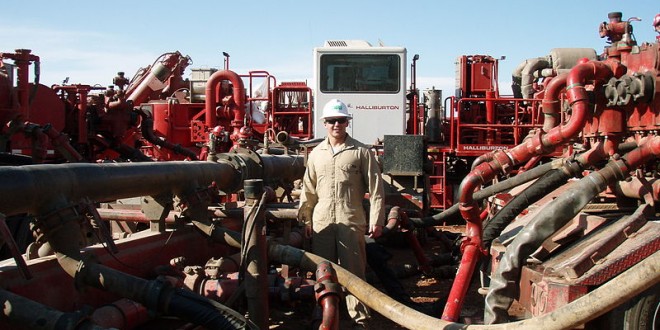
taken by Joshua Doubek
Fracking Does Not Mean the End of Opec – It is Not All it’s Cracked Up to Be
Fracking presents a new challenge for OPEC, as well as opportunities. The International Energy Agency (IEA) predicts that, over the next five years, one-third of the new oil production of the world will be developed in the USA. By 2020, the US will be a net exporter of gas. By 2035. It will be energy self-sufficient, they say.
The IEA also predicts that the US will overtake Russia with the next 2-3 years as the largest gas producer. This does not necessarily mean that Russia is finished. The European market's dependency on Russian gas will continue for many years to come. However, the impact on OPEC will be felt strongly in future years if fracking can overcome its current shortcomings.
Fracking, or hydraulic fracturing, is the process of extracting oil and natural gas from rock formations deep below the earth's surface. In a nutshell. The process forces cracks in underground rocks to release natural gas. Oil and natural gas inaccessible using conventional technologies are thus extracted from shale formations.
Horizontal drilling (in conjunction with conventional vertical drilling) allows the injection of highly pressurised fracking fluids into the shale area, creating new channels in the rock, from which natural gas is extracted more quickly and cheaply than by the old technique of drilling a well, which then has to be cased with cement to ensure groundwater protection.
What is the rationale behind fracking?
With escalating fuel prices, increasing global consumption, and the depletion of finite fossil fuel reserves, a main concern in the 21st century is to find alternative sources of energy and new methods of meeting demand. Fracking is one way of extracting vast amounts of fuel which would have formerly been inaccessible. Its champions hail it as a breakthrough. But the price, economically and environmentally, is too high to be ignored. In the long run, as the technology advances, fracking may become safe and economic. In the foreseeable future, it is neither.
The impact of fracking on existing oil producers:
The Economist reported on February 15 this year "that U.S. oil production reached a peak of 9.6 million barrels per day (bpd) in 1970, then declined to less than five million bpd in 2008. About that time, independent oil producers began adapting the new technologies of hydraulic fracturing ("fracking") and horizontal drilling (which had previously been used to tap natural gas found in shale) to reach shale oil.
"Since fracking was introduced, U.S. oil production has risen to 7.4 million bpd (barrels per day) and the U.S. Energy Information Administration (EIA) predicts that U.S. production will return to 1970 levels by 2019."
Current estimates show that OPEC accounts for 80 per cent of proven oil reserves and over 40 per cent of world oil production. The sums are all currently in OPEC's favour. In the Middle East, production costs per barrel vary, but don't top US$10. So OPEC producers remain in profit at well below US$100 per barrel. At that price, Russia breaks even. According to 2012 estimates, it costs around $70 to produce one barrel of oil from fracking. The US fracking industry becomes unprofitable if the price falls below US$ 80 per barrel.
The pro-fracking lobbies boast of the economic benefits that derive from domestic production, but underplay serious drawbacks. Opponents claim that fracking harms the environment, pollutes the atmosphere, and wreaks havoc on wildlife and ecosystems, which impacts on the food chain, damages the natural landscape, and contaminates groundwater. A 2011 study by the Massachusetts Institute of Technology said there is "evidence of natural gas migration into freshwater zones in some areas."
Depletion of scare water resources:
Fracking requires the pumping of millions of gallons of pressurised fresh water, a limited and expensive resource, mixed with a blend of chemicals and sand, deep down the well to fracture the shale. Imagine hundreds of wells in a particular province and the millions of gallons of water required for each well. This would adversely impact water sources. The annual water requirement for fracking operations in the West is somewhere between 70 billion and 140 billion gallons. For countries suffering from a scarcity, such as China and India, fracking is not an attractive proposition. Although experimental operations are under way, water-poor countries will continue to rely on crude oil from the Middle East.
The anti-fracking lobby has become stronger in the USA, and now in the UK. In the UK, government and industry are accused of putting profits before the interest of the communities.
Fracking has brought economic benefits to Canadian and US companies. It has created thousands of jobs. Increased production of oil in the US has made it less dependent on foreign imports from countries such Nigeria and Saudi Arabia.
But reports from USA indicate that shale oil production will decline in early 2020. A sudden sharp drop in world prices would make fracking, with its slender profitability margin, uneconomic.
According to a Citigroup report in February 2013, the record surge in US oil production - in the first ten months of 2012, US domestic production met 84 percent of its energy needs - now threatens the very existence of OPEC. The EIA reports that US oil production expanded by a record 790,000 barrels a day last year. According to the Citigroup report, by the middle of 2013 the US Gulf Coast would be supplied with oil from North Dakota and Texas, displacing imports from Saudi, Iraq and Kuwait, and West Africa.
OPEC has been forced to downgrade its own economic prospects. OPEC's World Oil Outlook anticipates a decline in global demand for its oil to 2016, with production falling to 29.7 million bpd. That's a drop of 1.6 million bpd from the forecast just a year ago. For the moment, much of the consequent fall in demand from the West is likely to be offset by a rise in demand from Asia, especially China and India. But the real fear for the Saudis, and for OPEC's members generally. Is what would happen to OPEC once US shale fracking technologies are exported worldwide?
These issues are precisely why we have been hearing so much of late about the Saudi Government's attempts to diversify its energy operations, including the potential exploitation of its own shale gas and oil resources.
A report by Reuters 14 October 2013 stated that "OPEC heavyweight Saudi Arabia is preparing to be among the first countries outside North America to use shale gas for power generation and thereby save more of its crude oil for lucrative exports. "We are ready to start producing our own shale gas and unconventional resources in various types in the next few years and deliver them to consumers,' said Saudi Aramco Chief Executive Khalid al-Falih."
But the Kingdom is hedging its bets, committing $100 billion of its oil wealth on a 40 gigawatt solar energy project, and turned to Japan for help in developing the nuclear technology to build 60 new nuclear power plants.
In the final analysis, shale oil will boost U.S. production, but won't bring energy independence. OPEC will remain a major player in the oil industry for many years. Despite being hailed as a miraculous panacea for energy dependence on volatile foreign producers, fracking is
 العربي الديمقراطي The Latest From The Arab World
العربي الديمقراطي The Latest From The Arab World





